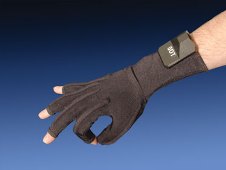Diagnosing and monitoring Parkinson’s disease using Evolutionary Algorithms
Stephen Smith

26 September 2014
Talk: 8pm - 8.15pm
Exhibition: 5.30pm - 10pmKing’s Manor (map)
Talk: KG/07
Exhibition: RefectoryFREE admission
No booking requiredTalk: no wheelchair access
Exhibition: wheelchair accessible
Event details
Parkinson’s disease affects approximately 120,000 people in the UK alone and will increase dramatically over the next decade. The most effective form of treatment for the symptoms is a drug called levodopa, but approximately 90% of patients who take it for ten years or more develop involuntary movements called dyskinesia - a major source of disability which severely affects the patient’s quality of life.
Dr Stephen Smith, along with Consultant Neurologists Dr Stuart Jamieson and Dr Jane Alty of Leeds General Infirmary, has developed novel technology to measure dyskinesia that is simple, reliable and safe to use. The system simply requires the patient to wear six small wireless sensors (on the limbs, head and torso) that continually monitor the patient’s movements over a period of 24 hours. These measurements are recorded on a smart phone and then analysed using evolutionary algorithms, trained to recognise dyskinesia and distinguish it from other movements.
This amazing technology allows us to measure dyskinesia more accurately than ever before and is useful in evaluating new drugs and other treatments for dyskinesia. Come along to discover the exciting new technology that could change lives forever.
![]()


